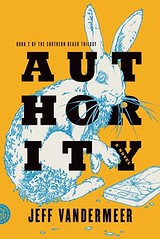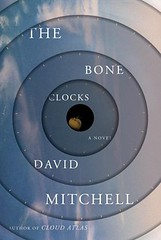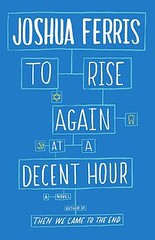“There’s a link between bigotry and bad spelling.” — David Mitchell, The Bone Clocks
 Invitation to a Beheading
Invitation to a Beheading
Vladimir Nabokov
![]()
If you’re the type who worries about “spoilers” and won’t read a book if you know how it’s going to end, you can skip this review (p.s. when I think of people like you, I picture a fussy eater).
My book club selected this short novel in the “lesser known works by famous authors” category. I was excited to read it because it’s been a long time since I’ve read anything by Nabokov, and though Invitation to a Beheading was nothing like what I had expected, reading it was as rewarding as I’d hoped it would be. Turns out I was the only member of our book club to appreciate this short novel.
Invitation to a Beheading has an old-fashioned, early 20th century literary feel; it’s unlike much of anything being written today. Many say it’s reminiscent of Kafka; Nabokov always said he was unfamiliar with Kafka’s writing at the time he wrote it, and I believe him. It’s Nabokov, all the way: interior, insightful, absurd, comic, human. Once I was past the first few pages and had adjusted my receptors, recently dulled by airport novels, the sense that I was reading something written long ago vanished.
Some interpret Cincinnatus’ mental diary of his experiences in prison as allegory; I took the diary at face value, with obvious allowances for dreamlike mental excursions. The prison director, the jailer, the executioner, the wife and her numerous family, the director’s little girl … these characters were as real to me as they were to Cincinnatus. The execution scene … well, I still do not know what to make of that. Was Nabokov a religious man? Or was he trying to say something else?
Regardless, the final pages where the prison cell, then the prison, then the entire fortress crumble as Cincinnatus is led out to his execution; where the crowd in the town square begins to be revealed as a painted backdrop, are as powerful as anything I’ve read in a long time, and will stay with me the rest of my life. No, definitely not Kafka. This is Nabokov … and he only got stronger from here.
 Waiting for the Barbarians
Waiting for the Barbarians
J.M. Coetzee
![]()
It was interesting to read this novel back-to-back with Nabokov’s Invitation to a Beheading. My book club selected the Nabokov novel for October and the Coetzee for November. Both feature narrators who are different from, and disconnected from, the day-to-day life of humanity; both detail the sordid punishments humanity inflicts upon the different; both are told from an interior point of view with uncomfortably intimate detail; both deal with the absurd and inevitable (despite Nabokov’s protests, in a manner reminiscent of Kafka). Where Invitation to a Beheading was dream-like, Waiting for the Barbarians is immediate and gritty, more on the order of a Cormac McCarthy novel. It is also the more overtly political of the two novels.
I’m going to talk about the story now, so, once again, go away if you’re worried about spoilers. God I hate that word, spoilers, but it serves as shorthand for discussing what happens in a novel.
We don’t know the name of the remote outpost administered by the magistrate, the narrator of Coetzee’s story, nor do we know the name of the empire the outpost represents. What we do know is that the magistrate, who has administered this outpost for decades, has established a working relationship with the small bands of nomads who inhabit the desert surrounding the outpost, a relationship that is upended by the arrival of another representative of the empire, an army colonel who captures, tortures, and kills some captives in an attempt to discover whether the “barbarians” pose a threat to the empire. The colonel destroys the tranquil relations between the nomads and the people of the outpost, and of course he comes back later with an army in order to administer a final solution.
Between the colonel’s appearances, the magistrate tries to atone for the empire’s excesses by taking in a young nomad girl who had been left lamed, blinded and orphaned by the colonel. He gradually becomes intimate with her, though it is not a relationship either of them want, and this is the most intensely agonizing part of the novel, reminiscent of a similar relationship in yet another Nabokov novel, Lolita … minus any joy, that is.
After some months of an uneasy relationship with the girl, the magistrate ventures with her into the desert to return her to her people, and to try to apologize for the colonel’s earlier actions. The journey is long and deadly, and though the girl is returned, the nomads refuse the magistrate’s attempts at reconciliation. When he returns from the journey, nearly dead, he finds the colonel has returned with his army. The magistrate is arrested for consorting with the enemy and is kept in the garrison in humiliating circumstances.
In the end the magistrate, unlike the narrator of Invitation to a Beheading, escapes execution. He even resumes his administrative duties, but the settlement has been decimated after the colonel’s failed war against the barbarians, and the future is entirely uncertain.
The narrative is gripping and immediate throughout, even though it is left up to us to put these events into a time and place. Me, I chose our unfocused war on terror, with the foolish colonel standing in for our elected leaders in the wake of 9/11. The magistrate is our better, more rational selves, albeit human and prone to failure himself. I could have chosen Vietnam or the Indian wars. I’m sure Coetzee had something more South African in mind, but the themes and lessons here are universal, without being universal in tone. The magistrate is a very real man; the nomad girl equally so. You can read this novel on many levels, and it will stay with you a long time.
 The Last Magazine: A Novel
The Last Magazine: A Novel
Michael Hastings
![]()
Pretty good sendup of the head-in-the-sand news magazine industry during the emergence of the online news and gossip industry that would soon displace it. Along the way Hastings lampoons corporate cowardice, careerism, ass-covering, moral compromise, envy, sloth, greed, gluttony, etc. Heavy-duty satire, reminiscent of Catch-22.
For a draft (it was found on Mr. Hasting’s PC after his death) it’s fairly well along; I like to think Hastings wouldn’t have objected to its posthumous publication. In any case, The Last Magazine is more satisfying than many posthumous works I’ve read.
One of the central characters, the journalist A.E. Peoria, is unsympathetic and hard to take. If reading explicit male masturbatory fantasy is not your cup of tea, you will cringe through some of the A.E. Peoria chapters. But really, everyone here, including the magazine intern who stands in for Mr. Hastings, is just awful. The fictional newsmagazine of the title (it’s no accident the jacket design resembles a Newsweek cover) is truly a wretched hive of scum and villainy.
Hastings is probably at his best when he describes the incredibly rapid escalation of media scandals (think Don Imus and his on-air “nappy-headed hos” remark) and the hysteria that follows as everyone remotely touched by it turns on his or her colleagues and runs for cover. I laughed out loud more than once while reading this novel.
The Last Magazine is well-written and a quick read. It conveys a ring of truth only a news industry insider could deliver. I was cynical before I read it; now I’m more cynical than ever. I think Michael Hastings scored the bullseye he was aiming at with this novel, and we should probably be glad he didn’t have more time to work on it, because he might have softened it down.
 Authority (Southern Reach Trilogy #2)
Authority (Southern Reach Trilogy #2)
by Jeff VanderMeer
![]()
I gave Annihilation, the first novel in the Southern Reach trilogy, a four-star rating. Authority, every bit as spooky and fascinating as Annihilation, is a wee bit draggier, thus the slightly lower rating.
The first novel, wherein the biologist directly confronts the incomprehensible alienness of Area X, felt Lovecraftian. This one, at least the long chapters describing Control’s frustrating and unsatisfactory career, self, and family, felt more like Kafka. Lovecraft comes back with a vengeance toward the end, however, when things start to happen inside and outside Area X.
Several intriguing developments are introduced in Authority. Some of these answer questions raised in Annihilation; others will perhaps be answered in Acceptance, the last novel of the trilogy. I am particularly intrigued by the local connections of some of the main characters, who appear to have been born and raised near … or actually inside … what was to become Area X. And then there is the director’s cell phone (dum dum dum).
It is also interesting to see the first book’s main character, the biologist, viewed through Control’s eyes, the main character of the second novel.
Apart from the somewhat draggy descriptions of Control’s thoughts and frustrations, I remain in awe of Jeff VanderMeer’s storytelling abilities. Much of what I initially perceived to be dragginess in the middle chapters turned out to be loaded with clues and hints, some resolved here but many not, and I am as eager to tackle the third novel as I was the second.
 Midnight in Europe
Midnight in Europe
Alan Furst
![]()
Alan Furst has a formula for his Night Soldiers novels, and he sticks to it. Some may object to that; I don’t. I like his formula. I like these tales of average but courageous men and women working against the rising tide of fascism in Europe in the years leading up to WWII. I like these tales of small-scale sabotage against Hitler’s war machine, carried out at great personal risk by soon-to-be-forgotten loners. The tales are fiction, but solidly based in history: men and women across Europe did these things in the 1930s and 40s; most of them died horribly, alone and forgotten; their spirits have been brought back to life by Alan Furst.
Midnight in Europe is not the best of the Night Soldiers novels, but it stands with the others. It deals with the Spanish Civil War, a war I know little about save for the involvement, on the Republican side, of many of my favorite authors of the era. I suspect parts of this novel will be hard going for American readers, because it’s not directly about more familiar villains like Hitler … though he looms large in the background.
I finished this novel wanting to learn more about the Spanish Civil War. For most American readers, I suspect, fascism is something that rose in the 1930s and was stamped out by VE Day in 1945. Not for the Spanish: Franco became Spain’s fascist dictator at the end of the Civil War in 1939 and stayed in power until his death in 1975.
The lead character in Midnight in Europe, Cristián Ferrar, is very much in the mold of Furst’s other behind-the-scenes characters. Once Ferrar starts to help other exiled Spanish patriots supply the Republican Army with arms and ammunition, he sinks neck deep into a pan-European network of gangsters and thieves, and I don’t doubt the actual people who procured arms for the Spanish resistance had similar adventures back in the day.
Midnight in Europe, like all of Alan Furst’s Night Soldiers novels, swept me along. I liked the story; I liked the background; I liked the characters; I liked learning something about the Spanish Civil War.
 The Bone Clocks
The Bone Clocks
David Mitchell
![]()
If I were new to David Mitchell, I would have liked this novel less. It’s a mess, but I so enjoy Mitchell’s other novels (and had so much looked forward to this one) I’m in a forgiving mood. Hence my relatively high 3-star rating, which reflects a love/hate reaction slewed a bit to the left.
There are plenty of self-referential commonalities between Mitchell’s novels; that’s part of the fun of reading him. When I initially recognized characters and themes from previous novels in The Bone Clocks, I took it as Mitchell being playful. By the time I finished the novel, though, the heavy borrowing from earlier work seemed more like a lack of fresh ideas.
What soured me, as it apparently soured other readers and Mitchell fans, was the long fantasy chapter beginning around page 450. Even though in the chapters leading up to this one there had been several hints of a coming battle between supernatural forces, the actual battle felt grafted on, even gratuitous.
As I waded through the climactic battle, my imagination failed me: I couldn’t picture the fortress in the air they were fighting in; I kept mistaking horologists for anchorites; I lost track of what the two sides were trying to accomplish. Mitchell’s bullshit psychovoltaic suasion mumbo-jumbo put me off; the fight in the fortress devolved, movie style, into one contrived cliffhanger after another; the whole thing may as well have been lifted from a Harry Potter movie script. And not only that: the ultimate result of the supernatural battle didn’t mean anything. Apart for a deus ex machina event affecting the main character, Holly Sykes, at the very end of the novel, none of the fantasy stuff seemed to have any impact on other characters or humanity in general.
I think the entire fantasy chapter could have been cut out. Snip or modify a few references to the fantasy stuff in other parts of the novel, and we might have had another memorable David Mitchell novel, one that resembled both Cloud Atlas and Black Swan Green and could stand with them.
I will say this: my love for Holly Sykes grew with every chapter (save the one), especially the final chapter, set in a chillingly plausible near future. David Mitchell is one of our very best storytellers. I only wish this novel hadn’t veered off in to the fantastic.
Books I Didn’t Finish
 To Rise Again at a Decent Hour
To Rise Again at a Decent Hour
Joshua Ferris
![]()
I was going to move this one from the “currently reading” to the “reading episodically” shelf, but honestly, I’m probably not going to pick it up again, so it goes on the “did not finish” shelf. My irritation with the main character, Paul (and Paul’s inner voice, endlessly obsessing over the same anxieties, underscoring what a dilatory asshole Paul is) grew page by page until I was a quarter of the way through the novel, at which point my own inner voice said it had had enough.
Paul,
You say that “many of your favorite authors of the era” fought in the Spanish Civil War. I assume Hemingway is one? Also Orwell? “Homage to Catalonia” is a terrific book, and I cannot praise “For Whom the Bell Tolls” enough. Perhaps not the whole, but parts of FWtBT are just about the best writing I have ever enjoyed. Both of those books provide a lot of background on that war. I am sure you have said, but I can’t remember: Do you read these on a kindle-like device or do you prefer the physical version? Lastly, thank you for your reviews; they are always entertaining. Paul, from “To Rise Again…” sounds like me. 🙂